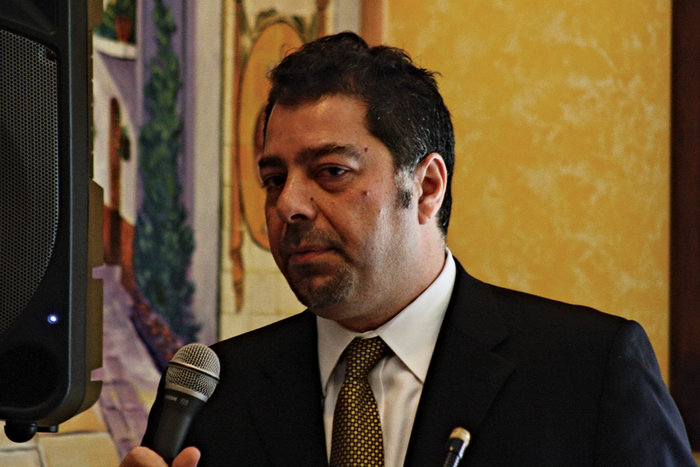Curious merchants from throughout the city came out to the March 1 business lunch to get the lowdown on a new discount card that the City of Bayonne is touting as a tool for increasing local sales.
While many may have been curious, the Shop Bayonne Tax Card Program proved not to be the panacea they might have sought for curing declining sales. But it may prove to be one more tool merchants can use to bring people out to shop on Broadway again.
Terrence Malloy, who oversees both the Urban Enterprise Zone (UEZ) and the Special Improvement District (SID), said the new discount-card program is strictly voluntary, but one that he believes will work.
He noted that while there is almost no negative impact on merchants, it would provide an incentive for people to shop in town.
Residents, however, would feel the biggest bite because 25 percent of the discount would go to the firm that operates the card program. This means that every $100 in discounts would provide residents with only $75 toward their property taxes.
“We get 25 percent of whatever discount the merchant offers,” said Nick Campanella, who represents the program. “That’s how we make our money. We try to work with the UEZ or the chambers to get a minimum of 15 to 20 businesses to sign onto the program.”
“It has worked elsewhere.” – Terrence Malloy
____________
“We developed this program about three years ago,” Campanella said. “We were from the financial side, and we wanted to find a way to create a program that was similar to a loyalty card and identify the residents who would use it. We put a spin that every time a resident uses our card, they would get a credit. So we started to market the program, reached out to a lot of townships, and we were fortunate that the League of Municipalities picked up on our story.”
He said the program is similar to the loyalty-card programs in many major chain stores, but the discount goes to the resident to use against property taxes. In Bayonne, the program is also open to renters, who would get a check at the end of the year.
“If a resident knows the discount will go to pay property taxes, this becomes an incentive to do business at the local store,” Campanella said.
The business person will offer his or her own percentage of the purchase price of the item or service. The shopper would pay full price, but 75 percent of the discount would go into an account which would accumulate over the year. Residents can check on the amount they have accumulated on a website.
Bayonne produced a card in conjunction with the mayor and council and mailed it to households with a letter from the mayor explaining the program.
“Once the resident gets the card, they put in a pin number that activates the account on a dedicated website,” Campanella said. “Every participating merchant on the website has a banner ad and hot links, which are directed to the merchant’s website, and show what the business offers as well as the net discount that business is offering to that resident.”
Merchants pay a $10-a-month processing fee to process the card through dedicated software. The store owner also gets a window cling to let people know they are a participating merchant. When residents register their cards, they have a directory of every business that is participating.
“A resident can decide on how they want to shop based on the discounts offered,” Campanella said. “The program is voluntary. You can sign up for the program or opt out at any time. There is no lock-in rate, no mandatory requirements. The only charge a business incurs is $10 once a month. There are no per-swipe fees.
Residents will get emails showing how much they spent and how much they saved, and if they log on, they can see the accumulated savings.
Using municipal software, the town will show how much each property has accumulated so far.
Shortly before tax time, the money is transferred to the city, which applies these funds to paying a portion—or possibly all the taxes.
Campanella said the program in Marlboro is averaging 50 to 75 transactions a day.
While the company will have sales representatives in town walking up and down the streets to enroll businesses, there will be an online signup that merchants can use at their own convenience.
Those who use the card most are senior citizens, Campanella said.
Al Sullivan may be reached at asullivan@hudsonreporter.com.
